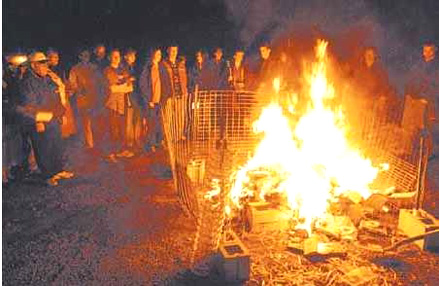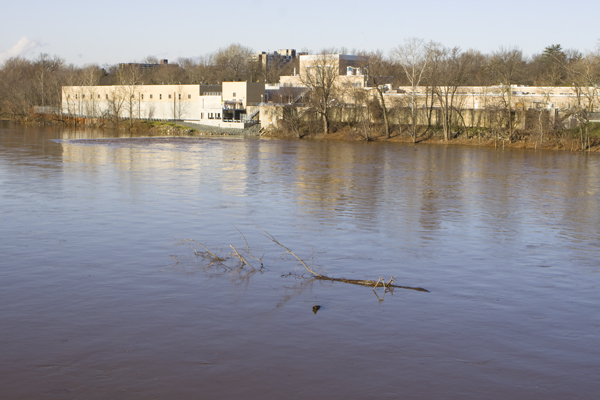Total Collapse at NJ Drinking Water Quality Institute

Bear with me here because I still may be a little angry.
But what I witnessed today amounted to a total breakdown in a key scientific and public health institution designed to protect public health from the risks associated with drinking water contaminants.
The NJ Drinking Water Quality Institute (DWQI) held its regular quarterly meeting today. The DWQI is responsible for making independent scientific recommendations to DEP on safe drinking water.
The DWQI is in disarray. After 8 months, the Governor still has not appointed a successor to former Chair Mark Robson, who resigned in January. Vacancies remain to be filled.
Today’s DWQI meeting was preceded by an unprecedented series of negative news stories and editorials that disclosed significant public health risks from drinking water due to chemicals, radiation, and unregulated contaminants like drugs in drinking water supplies (for examples click on link and read:
- Clean Water Advocates Petition DEP to Clean Up Contaminants
- NJ considers new standards for radon in drinking water; some in Morris would flunk
- N.J., Pa. weigh how much to regulate deadly radon
- Radioactivity rampant in New Jersey well water
- TIGHTER NEW JERSEY DRINKING WATER STANDARDS IN OBLIVION – Drinking Water Institute Chair Resigns in Frustration; Successor to be Announced
- Editorial: Cleaner water
- Perchlorate limits to be set for water
- New Jersey backs off plans to test water supplies for a chemical found in rocket fuel and fertilizer
After a pummeling like that, I expected that there would be a thoughtful response from the DWQI and DEP.
I expected an announcement of specific steps and action plans to move forward on protecting drinking water from these chemical pollutants.
But I was dead wrong.
The DWQI took no action and made no recommendations to DEP for action.
DEP representatives on the DWQI evaded all tough questions and decisions and made no commitments to do anything.
It was obvious that rank fear of political retaliation related to the costs of meeting the DWQI science based standards was the major barrier to moving forward. Speculative compliance cost considerations completely dominated the science and trumped all public health considerations.
For that I blame Governor Christie and his cost benefit and federal consistency policies under Executive Order #2 – it is having a hugely chilling effect.
I also blame DEP Commissioner Martin who has shown an inclination to attack his own DEP scientists and an arrogant and ignorant unwillingness to tolerate independent science and different opinions.
Despite my detailed inquiries during the public comment period, it was obvious that both DEP and the DWQI were evasive instead of responsive.
After my thorough questioning during the public comment period, it became painfully obvious that not only were both DEP and the DWQI in disarray, but that staff and DWQI members were too intimidated to say anything, even on purely science questions.
This evasion was with the exception of Mr. Cohn from DHSS, who agreed with my concerns about drought – see # 6 below. Additionally, DEP agreed to disclose the results of prior unregulated contaminant sampling (at least 199 episodes) that found over 500 unregulated chemicals in public water supplies. But DEP did not agree to conduct current health and ecological risk screening and risk assessment for these 500+ chemicals (as requested in the PEER petition to DEP for rule-making) or to disclose or update the prior 2003 toxicology and risk assessment methodology and results on these 500+ chemicals).
In my testimony, I presented the PEER petition and asked for status reports and DWQI followup oversight on:
1) the October 2005 DWQI perchlorate MCL recommendation which was proposed by DEP as an MCL in March 2009 . DEP Commissioner Martin claimed that he deferred action on adopting DEP’s proposed MCL because allegedly EPA would adopt a MCL “this summer”. Summer is over and EPA failed to act. So where is DEP MCL?;
2) the March 2009 DWQI recommeded updates to MCLs on multiple hazardous chemical contaminants to reflect current science;
3) the status of the February 2009 DWQI recommended radon MCL;
4) the stauts of the May 2010 policy paper on 500+ unregulated contaminants and treatment strategy (In response, I was told by DEP staff that action had to wait until pilot studies were completed. When I asked about the status of the pilot studies, I was told that the 2 pilot systems had not even installed the carbon filter treatment technology and that DEP felt that they could not push this process. In other words, this is on a slow road to nowhere – click here for complete details, including prior 2004 “Interested Party Regulatory review“);
5) the status of addressing the findings on uranium in drinking water sampling in the Highlands presented on May 7;
6) health risks caused by high concentrations of chemical contaminants in water supply source waters, given current drought conditions. Wastewater effluent makes up 100% of the flows in the Passaic/Pompton Rivers above water supply intakes. Millions of people are drinking increased and unsafe concentrations of hundreds of chemical pollutants.
Both DWQI members and DEP staff refused to respond to any of these questions in any way that would represent a commitment to do anything to reduce known unacceptable public health risks from drinking water.
And that is a shocking and totally unprofessional abdication.


